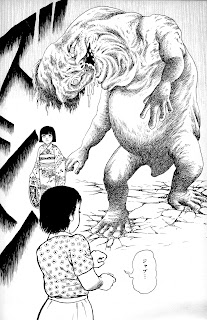Pass through, pass through
Where does this narrow path lead?
It leads to Tenjin shrine
Won't you please let me pass?
Those without business may not pass
I have come with my child
To present an offering celebrating their seven years
Though going be easy, the return be frightful
Frightful it may be
Pass through, pass through
Pass through, pass through
Toryanse, or Pass Through, is played much like to London's Bridge. Two children sing as they join hands to form an arch that the others duck under. When the song stops, the arch comes down and anyone trapped inbetween switches places with one of the arches.
 |
| The narrow path still stands. (Source) |
At face value, the song is about a family convincing the gate keeper to let them inside Kawagoe castle north of Tokyo. The shrine refers to the Miyoshino shrine north of Tokyo, one of the fourteen thousand holy sites dedicated to the poet Sugawara no Michizane who was deified as Tenjin at the end of 10th century AD. During the Edo period, peasants were only allowed into the castle for auspicious occasions, in this case the Shichi-Go-San festival celebrating a child’s third, fifth, and seventh birthdays, all joyous benchmarks in a time fraught with high infant mortality rates.
This commotion also made it easy for spies and thieves to sneak in with the revelers. Sneaking out was another story. Visitors were waved through, only to face strict interrogation as they tried to leave. Though going be easy, the return be frightful, in more ways than one.
 |
| Send your daughters to the slaughter at the Shici-Go-San festival. (Source) |
Some macabre wordplay turns this simple caution into a warning from beyond the grave. In Japanese, "to go" (行く) is homonym for “to pass away” (逝く). Similarly, kaeru for “to return home” (帰る) can be perverted into “return from the dead” (甦る). Dying’s the easy part, getting back is the problem. Take care when passing through.
This urban legend has taken up residence at cross walks in major cities. Busy intersections play folk tunes during green lights to let pedestrians know that they have the right of way, the most infamous being Toryanse. Here's the creepy bit—after Though going be easy, the return be frightful, the high notes in the last stanza segue perfectly into wailing ambulance sirens. The subliminal message urges you to look both ways when passing through, least you fail to make it across.
Another interpretation brings the danger much closer to home. A forgotten tradition of Shichi-Go-San involves hanging a paper charm in the shrine to pray for the child's safety. As the old saying goes, “children are property of the Gods until they turn seven” (七つまでは神のうち), making the talisman a proxy sacrifice that hopes to sate the Gods in keeping them from abducting the village youth.
Even today, missing children are said to be the victims of kamikakushi (神隠し), literally to be “spirited away” by the Gods. Kamikakushi was also a euphemism for mabiki (間引き), the practice of weeding out weak sprouts to give strong ones room to grow—which is to say, planned infanticide to reduce the number of mouths to feed. Toryanse may describe parents agonizing over a life-or-death decision. Do they make their offering at the shrine one of paper, or one of their own flesh and blood?
Even today, missing children are said to be the victims of kamikakushi (神隠し), literally to be “spirited away” by the Gods. Kamikakushi was also a euphemism for mabiki (間引き), the practice of weeding out weak sprouts to give strong ones room to grow—which is to say, planned infanticide to reduce the number of mouths to feed. Toryanse may describe parents agonizing over a life-or-death decision. Do they make their offering at the shrine one of paper, or one of their own flesh and blood?
In other cases, being spirited away is more literal than metaphor. And when those abducted make the difficult trip back from the other side, they don’t return alone.
Folklore horror author Morohoshi Daijiro writes about a variation of Toryanse, Kaeryanse, or Return Home. In his manga "Tenjin-Sama", the song acts as a key between our world and a shadow zone populated by forgotten deities. When this gate at the Tenjin shrine is accidentally unlocked, a young girl dressed in traditional shichi-go-san ornamentation passes through it, together with the demon who first kidnapped her. With the portal left open, the Old Gods have free reign to claim their right—unattended children under seven.
Yokai hunter Hieda Reijiro is there to save the day in typical anthropologist fashion. If Kaeryanse is a song of summoning, than Tooryanse must be a song of banishment. Hieda sends the monster into the void, though not for the first time. Recall that Tenjin shrines were originally dedicated to other Gods before Sugawara no Michizane usurped them a century ago. Our demon is one of the many beings pushed out of reality by the current Japanese pantheon. Who can speculate the intentions of these Great Old Ones, or the vengeance they will unleash when freed from their prisons to pass though, pass through?



I wrote about "Toryanse" and posted a remix of the Japanese stoplight song:
ReplyDeleteJapan…where the traffic lights sing"
http://news.3yen.com/2006-10-25/japanwhere-the-the-traffic-lights-sing/
Hi, from almost 10 years in the future.
DeleteWhen you wrote your comment I was a child, time flies.